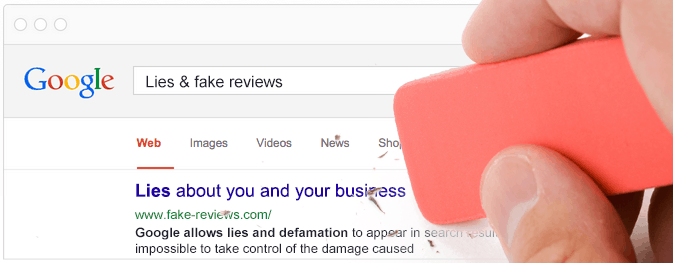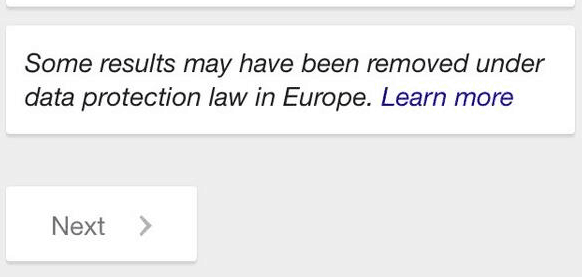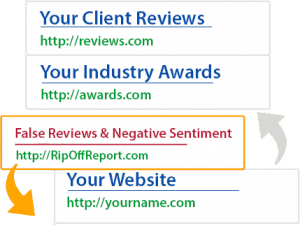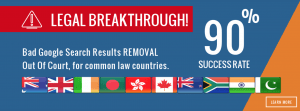Remove Content from Google Self Help Guide

Remove Content from Google Do-It-Yourself
REMOVE CONTENT FROM GOOGLE – COUNTRY POLICIES
United States of America
United States residents face tough challenges when seeking to remove content from Google. Google cannot be held liable for defamation from USA residents because of legislated protection provisions in “Section 230(C) of The Communications Decency Act.” As such, Google has little incentive to spend time and money addressing defamation take-down demands, even if it can be proven that the content is false.
USA SUMMARY: In most cases, Google will not de-index defamatory search results without a court order if you are in the United States. If this is something that you wish to pursue, contact our Licensed Private Investigations & Digital Litigation Support business unit.
UK, Australia, Canada, and other common-law countries
Thanks to a change in defamation law, citizens from common-law countries can usually remove defamation from Google entirely upon request. We have a 90% success rate in removal for our common-law country clients.
GEO-BLOCKING LIMITS: When Google removes of damaging search results for you, it will only happen via “geographical blocking” technology. This means that the only people conducting searches from within your country will not see the defamation. People in other countries will still see it, as will people within your country who are using proxy servers.
Here you can initiate a deletion request pursuant to Google’s Removal Policies for these countries here.
HOW TO GET GOOGLE TO REMOVE PERSONAL INFORMATION
There are several ways to remove content from Google. Depending on your case, it might be a matter of submitting the URL to Google, or you might have to go to court.
Contact the Webmaster first
Even if you manage to get Google to delete the site with personal information (or image) from Google search results, the actual web page still exists. Which means that the content can still be found through the URL to the site, social media sharing, or other search engines. But if the webmaster removes the web page, Google will de-index the content from their search results because the content doesn’t exist anymore.
However, there are some exceptions. If you know the webmaster or author to be a narcissist or in any other way dangerous and vindictive, it might be better to go straight to Google instead. Picking a fight in these cases may only cause more scrutiny and online attacks.
Google Content Removal policy
Is sensitive personal information, like your bank account number, signature, sexual images or video material is published on the internet without your consent? You can ask Google to remove this content from the search engine and thus search results.
According to Google’s Removal Policy Google will remove:
- National identification numbers like Social Security Number, Tax Identification Number, Resident Registration Number, Resident Identity Card, etc.
- Bank account numbers
- Credit card numbers
- Images of signatures
- Nude or sexually explicit images that were uploaded or shared without your consent
Information Google usually doesn’t remove:
- Date of birth
- Addresses
- Telephone numbers
Remove outdated or removed content
If the damaging material is removed or changed, you can tell Google that the content is no longer there or outdated. Submit the URL in webmaster tools to request removal.
When you requested the removal, you can check the status in the same ‘remove outdated content’ page.
RIGHT TO BE FORGOTTEN IN THE EU
Since 2014, the European Union Court of Justice decided that Google is obliged to delete content in certain cases. “If, following a search made on the basis of a person’s name, the list of results displays a link to a web page which contains information on the person in question, that data subject may approach the operator directly,” the judges ruled.
And so, Google is obliged to remove the damaging content from the search engine, according to the ‘Right to be forgotten.’

Google will delete content if they find that the content in question is:
- Hurting your privacy or
- False, defamation
- Not benefiting anyone else
The US, Canada and Australia, unfortunately, don’t enforce the ‘Right to be forgotten.’
USE A COURT ORDER FOR CONTENT REMOVAL
Don’t want to pick a fight with the webmaster or author? Can’t get content removal for your personal information? The only relief might be through injunctive or declaratory relief.
Try to obtain a court order, declaring that the content infringes your privacy or is false and defaming. Submit this court order to have Google to remove content. Google has to remove the content.
If you go down this road, make sure that Google removes the content from showing up in search results WORLDWIDE.
WHAT IF YOUR REMOVE CONTENT FROM GOOGLE REQUEST IS DENIED
Our team can make you look better in Google Search Results, by burying the problem content. We can push damaging results from their high ranked positions, off the first page of Google and beyond. Use the following form to generate a quote automatically:

How to Remove Content from Google
Type your name, brand, or any search term that is hurting your business. Our system will generate a quote automatically.
Defamation Litigation May be an Option
If the content is false and defamatory, litigation may be an option. Our Founder Michael is a Licensed Private Investigator and Litigation Support specialist. He can help you find a suitably qualified attorney, no matter where you are in the world, and work as a team to reduce court costs and lawyer fees, as well as speeding up the duration of your lawsuit. If your attacker is anonymous, our cyber crime department can help identify the antagonist.
 Page1.me
Page1.me